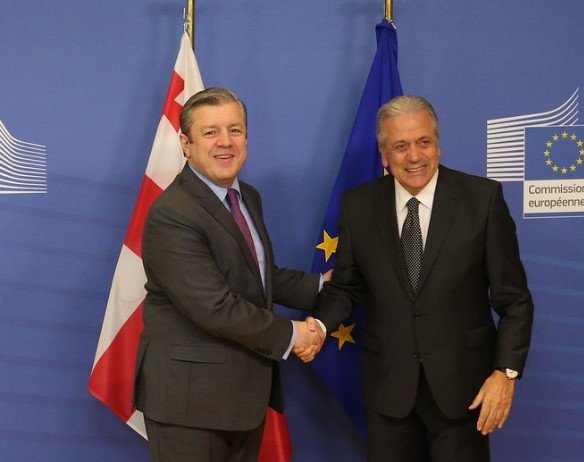Georgia faces a stark warning from the European Commission (EC): take urgent action or risk the activation of the EU’s visa suspension mechanism. The Seventh Report on Georgia’s compliance with visa liberalization benchmarks paints a grim picture, with European officials growing increasingly concerned over recent political and policy decisions.
Visa-Free Travel at Risk
The European Commission’s report, released on December 7, highlights Georgia’s lack of progress in aligning its visa policies with EU standards. This comes amidst heightened tensions following the Georgian Dream party’s reelection and Prime Minister Irakli Kobakhidze’s controversial decision to suspend EU membership negotiations until 2028.
The visa-free travel agreement, which allows Georgians to visit Schengen Zone countries without visas, is now under threat. The Commission’s findings suggest that Georgia is falling short in areas such as visa policy alignment, migration management, and border security.
One particularly glaring issue is Georgia’s recent visa waiver agreement with China, signed in April 2024. The EC report criticized this move, stating it increased divergence from EU visa policies rather than closing the gap.

EU Signals Growing Frustration
The report isn’t the only warning Georgia has received. Key EU figures have voiced their concerns, signaling that the patience of European policymakers is wearing thin.
- Dutch Foreign Minister Caspar Veldkamp announced plans to formally urge the EU to make Georgia aware of the repercussions of its current path.
- EU Ambassador to Georgia Pawel Herczynski confirmed that the issue will be on the agenda for the EU Council of Foreign Affairs meeting on December 16.
The Commission’s report also outlined specific recommendations for Georgia, urging the government to swiftly address gaps in visa liberalization benchmarks.
Why Is Visa Liberalization Important?
For many Georgians, visa-free travel is a tangible symbol of the country’s European aspirations. The 2017 visa-free travel agreement was heralded as a milestone in Georgia’s pro-Western trajectory, fostering closer ties with the EU.
Suspending this privilege would have far-reaching consequences:
- Economic Impact: The agreement facilitates business and trade by allowing Georgian professionals easier access to European markets.
- Public Perception: A suspension could further polarize the Georgian populace, many of whom already feel disillusioned with the government’s handling of EU relations.
- Political Isolation: It would signal a setback in Georgia’s long-standing ambition to integrate into European structures.
Areas of Concern
The EC report identified several key areas where Georgia needs to improve:
- Visa Policy Alignment: Georgia’s decision to sign a visa waiver agreement with China was cited as a step backward, highlighting a divergence from EU standards.
- Border and Migration Management: The Commission flagged deficiencies in how Georgia handles border security and migration processes.
- Document Security: Ensuring secure travel and identity documents is a critical aspect of visa liberalization benchmarks.
The EU has made it clear that without urgent progress in these areas, it will have no choice but to activate the suspension mechanism.
A Crossroads for Georgia
The stakes are high for Georgia’s leadership. The EU’s warnings come amid ongoing political turmoil in the country, including mass protests against the suspension of EU membership talks. Critics argue that the government’s actions are undermining years of progress toward European integration.
Georgian President Salome Zourabichvili has urged the ruling party to reconsider its stance, warning that further alienation from the EU could have dire consequences. “We cannot afford to jeopardize our future,” she said in a recent address.
The coming weeks will be critical. With the EU Council of Foreign Affairs set to discuss Georgia’s status on December 16, the government faces mounting pressure to act swiftly and decisively to salvage its European aspirations.
